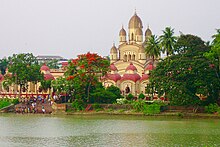User:Cullen328/Kalpataru Day


Kalpataru Day also called Kalpataru Diwas or Kalpataru Utsav is an annual religious festival observed by monks of the Ramakrishna Math monastic order of Hinduism and lay followers of the associated Ramakrishna Mission, as well as the worldwide Vedanta Societies. These organizations follow the teachings of Ramakrishna, the 19th century Indian mystic and figure in the Hindu Renaissance.
The event commemorates the day on January 1, 1886 when his followers believe that Ramakrishna became an avatar, or God incarnate on earth. It is held each January 1. Although the observances are held in many locations, the most significant celebration takes place at the Dakshineswar Kali Temple near Kolkata (then called Calcutta), the temple where Ramakrishna spent most of his adult life. It is classified as one of the "Lord's special festivals" by followers of Ramakrishna.[1]
In India on January 1, 2010, as in other years, "Devotees from all over the country thronged the famed Kali Temple at Dakshineshwar for Kalpataru Utsav, which is celebrated on this day every year." [2] India's Eastern Railway scheduled two special trains on January 1 to carry the crowds to Kali Temple. [3]
Origins[edit]
The first Kalpataru Day, January 1, 1886, was "an event of unusual consequence and meaning" in the life of Ramakrishna and his followers. [4] Ramakrishna was suffering from throat cancer at that time, and his health was declining. He and his closest followers had moved to a garden house in the northern neighboood of Calcutta of Cossipore. January 1 was a relatively good day for him, and he took a walk in the garden. There, he asked one of his followers, Girish, a question he had often asked before, "Who do you say that I am?" [4] Girish responded that he believed that he though Ramakrishna was "God incarnate, come to Earth out of mercy for humankind". [4] Ramakrishna replied, "What more shall I say? May you be awakened."[4] Ramakrishna then entered an "ecstatic state" and began touching all of his followers except one (who had abandoned the ascetic tradition by marrying). Those he touched reported experiencing a variety of new states of consciousness, including vivid visions. For one, Vaikuntha, the visions persisted and interfered with daily life, so that he feared that he might be going insane.
One disciple, Ramachandra Dutta, explained that Ramakrishna had, in effect become Kalpataru (also called Kalpavriksha), the "wish-fulfilling tree" of Sanskrit literature and Hindu mythology[4]. Dutta named the commemoration of this mystical event "Kalpataru Day" as a result. [5] This event "carried meanings and memories of cosmic import for the disciples"[4] and also prepared them for Ramakrishna's death",[4] which occurred only a few months later, on August 16, 1886.
References[edit]
- ^ The Brahmavâdin, Volume 10. M.C. Alasingaperumal. 1906. pp. page 465.
{{cite book}}:|pages=has extra text (help); Cite has empty unknown parameter:|coauthors=(help) - ^ "Kolkatans start new year with prayers and picnics". BombayNews.net Mumbai. January 1, 2010. Retrieved January 2, 2011.
{{cite web}}: Cite has empty unknown parameter:|coauthors=(help) - ^ "Special trains". The Telegraph. Calcutta, India. Retrieved January 2, 2011.
{{cite journal}}: Cite has empty unknown parameter:|coauthors=(help) - ^ a b c d e f g Kripal, Jeffrey John (1998 (2nd edition)). Kālī's child: the mystical and the erotic in the life and teachings of Ramakrishna. Chicago: University of Chicago Press. pp. 258–261. ISBN 9780226453774.
{{cite book}}: Check date values in:|date=(help); Cite has empty unknown parameter:|coauthors=(help) - ^ Balakrishnan, S. (December 31, 2001). "The spiritual significance: On January 1, 1886, Ramakrishna Paramahamsa experienced divine bliss. That day is celebrated as "Kalpataru Day" by his followers". The Hindu. Chennai. Retrieved January 3, 2011.
{{cite journal}}: Cite has empty unknown parameter:|coauthors=(help)
